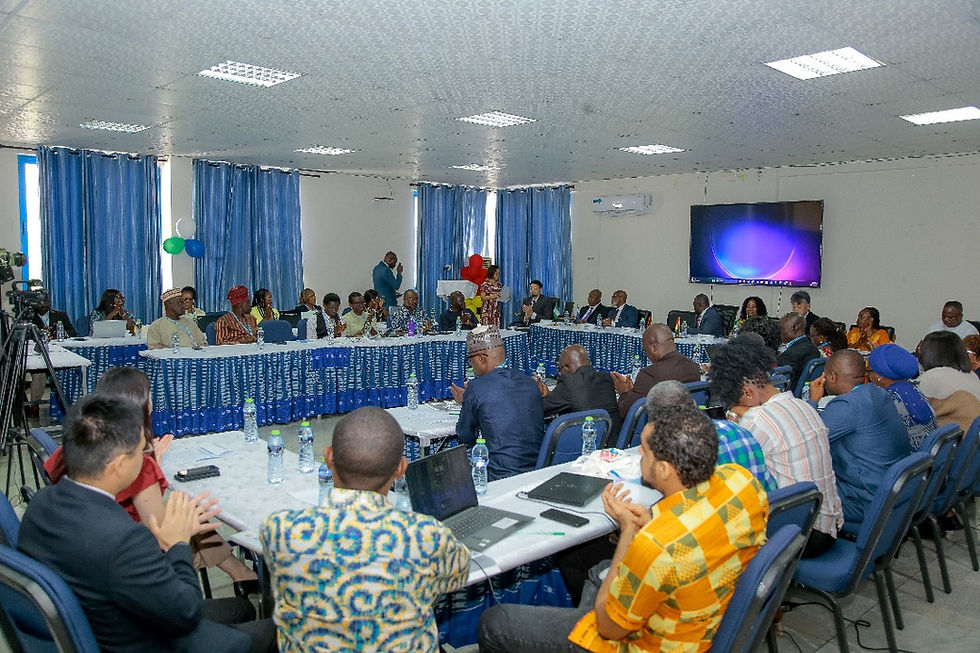Minister of Communications announces ambitious 5G network initiative for Ghana
- Think News Online

- May 30, 2024
- 3 min read

Minister of Communications and Digitalization, Ursula Owusu-Ekuful, has announced a transformative initiative to introduce 5G network services in Ghana, poised to revolutionize the country's digital landscape.
Speaking to journalists in Accra on Thursday, the Minister outlined the comprehensive plan designed to elevate Ghana’s technological infrastructure.
“Ghana is well positioned for 5G Network Services,” Minister Owusu-Ekuful stated.
She revealed that the Next-Gen InfraCo (NGIC) plans to adopt India’s successful model, which combines affordable handsets, digital platforms, and localized content, aiming to replicate high-speed mobile data accessibility across Africa.
This strategy, she noted, will ensure that digital services remain accessible and relevant across all sectors.
"The wholesale 5G service is slated for launch in the last quarter of this year, with plans to deploy 4,400 sites, targeting 37 million end-consumers by 2028, and striving for 100% digitalization by 2030"
Despite a mobile penetration rate of 115%, she disclosed that Ghana’s current 4G penetration stands at only 15%, with many still relying on 2G networks.
She explained that through NGIC, the goal is to increase 4G penetration to 80% and beyond, deploying 3,200 4G and 1,200 5G sites over the next three years.
She added that the Rural California Project has already built over 1,000 4G sites, significantly boosting adoption in rural areas.
"NGIC aims to expand these services to ensure high-speed internet reaches even the most remote communities in Ghana. The benefits of 5G technology are numerous,” Owusu-Ekuful emphasized.
“It offers faster speeds, lower latency, more connections, and better reliability. These improvements will support a range of new applications and services, from enhanced mobile broadband to massive machine-type communication and ultra-reliable low-latency communication. 5G will transform industries, enable new business models, and drive economic growth.”
"As of January this year, 261 companies in 101 countries have launched commercial 5G services. In Africa, 15 countries, including South Africa, Nigeria, Kenya, and Tanzania, have deployed 5G services"
The Minister hinted that Ghana’s innovative shared network infrastructure model for 5G deployment will provide a level playing field for all service providers, ensuring equal access to 5G services.
"NGIC (National Ghana Infrastructure Company) will collaborate with network operators to launch affordable 4G and 5G-enabled devices within the year, making advanced services accessible to all Ghanaians regardless of their network provider. This initiative learns from past experiences, such as the limited 4G infrastructure initially acquired by only one network operator"
Madam Owusu-Ekuful stressed that in-line with international best practices, NGIC's licenses will be long-term, issued for a minimum of 10 years.
This approach, she hinted acknowledges the capital-intensive nature of these projects, allowing sufficient time for licensees to see returns on their investments.
Ghana’s robust regulatory framework, existing infrastructure, market demand, and government support position the country as a leader in digital transformation in Africa.
The shared infrastructure model aims to reduce investment pressures on incumbent Mobile Network Operators (MNOs) while delivering top-tier 5G services to all consumers.
The increased speed and network capacity will enable significant data transactions, fostering economic growth, innovation, job creation, and new business opportunities across various sectors.
"Key partners in this initiative include Nokia, which will provide a state-of-the-art radio access network and establish its first technology innovation lab in Accra, offering career opportunities for engineering graduates and creating 5G use cases for the continent"
"Tech Mahindra, a global managed services company, will build a cloud-native core network to support infrastructure deployment and associated services, also setting up a global software delivery center in Ghana. Radisys, a geoplatform company, will provide Open Radio Access Networks (Open RAN) and affordable 4G and 5G devices, fostering sustainable and inclusive development"
“This collaboration is a significant step towards achieving a fully digitalized Ghana by 2030,” concluded Owusu-Ekuful.
"Our proactive approach and commitment to innovation have positioned us as a leader in digital transformation in Africa, and we are excited to see the benefits of 5G technology come to fruition.”
This initiative marks a pivotal moment in Ghana's digital journey, promising to transform the nation’s technological landscape and enhance the quality of life for all Ghanaians.
Story by: Joshua Kwabena Smith








Comments